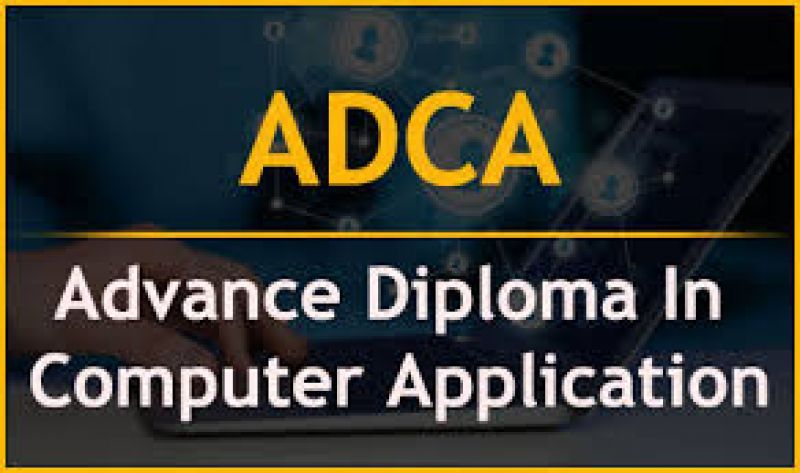The Advanced Diploma in Computer Applications (ADCA) is a comprehensive program designed to provide students with an in-depth understanding of computer applications, software, and tools. It focuses on equipping students with the necessary skills to handle various computing and technology-related tasks in today's fast-paced digital world. This 12-month course covers multiple aspects of computer applications, programming, and software management, preparing students for a wide range of career opportunities in IT and business environments.
Syllabus for Advanced Diploma in Computer Applications (12 Months)
Semester 1: Basics of Computer and Programming Concepts
-
Introduction to Computers
- History and evolution of computers
- Types of computers and their applications
- Basic components of a computer system (hardware and software)
- Operating systems: Windows, Linux, and Mac OS
-
Microsoft Office Applications
- MS Word: Document creation, formatting, tables, mail merge, and advanced features
- MS Excel: Working with formulas, functions, charts, pivot tables, and data analysis
- MS PowerPoint: Creating professional presentations, multimedia integration, and slide animations
- MS Access: Database creation, queries, forms, and reports
-
Computer Programming Concepts
- Introduction to programming languages (C, C++, Java, or Python)
- Basic programming concepts: Variables, data types, operators, and control structures
- Functions, arrays, and loops
- File handling and input/output operations
-
Internet & Web Technologies
- Introduction to the Internet: Working with browsers, search engines, and web tools
- Basics of HTML: Structuring a webpage, elements, tags, and attributes
- Introduction to CSS: Styling web pages
- Basic understanding of JavaScript for interactivity on websites
-
Email and Internet Communication
- Working with email: Configuration, sending/receiving emails, attachments, and email etiquette
- Social media tools for communication
- Introduction to cloud computing and its applications (Google Drive, Dropbox, etc.)
Semester 2: Advanced Computer Applications and Software Tools
-
Advanced Programming Concepts
- Object-Oriented Programming (OOP) concepts (classes, objects, inheritance, polymorphism, etc.)
- Data structures: Arrays, linked lists, stacks, queues, and trees
- Algorithms and problem-solving techniques
- Introduction to database management using SQL
-
Web Development (Advanced)
- HTML5: Advanced features for modern web design
- CSS3: Responsive design, media queries, and Flexbox
- JavaScript (Advanced): DOM manipulation, event handling, and forms validation
- Introduction to Web Development Frameworks (e.g., Bootstrap, jQuery)
-
Database Management Systems
- Fundamentals of Database Management (DBMS)
- Relational Databases and SQL (Structured Query Language)
- Normalization and data integrity
- Advanced SQL Queries: Join operations, subqueries, and aggregate functions
-
Graphics and Multimedia Applications
- Introduction to graphic design tools (Adobe Photoshop, CorelDRAW, or GIMP)
- Basics of image editing, vector graphics, and raster graphics
- Creating multimedia presentations with video, audio, and graphics
- Basic animation and editing using tools like Adobe Premiere or Windows Movie Maker
-
Software Engineering and Application Development
- Introduction to software development life cycle (SDLC)
- Requirements gathering, design, coding, testing, and deployment
- Use of Integrated Development Environments (IDEs) for coding
- Debugging and troubleshooting techniques
Semester 3: Advanced Topics in Computing and Networking
-
Networking and Cybersecurity
- Basics of computer networks: LAN, WAN, Internet, and Intranet
- IP addressing, DNS, routers, and switches
- Introduction to network security: Firewalls, encryption, and security protocols
- Cybersecurity threats: Malware, phishing, and data breaches
-
Cloud Computing and Virtualization
- Introduction to cloud services: IaaS, PaaS, and SaaS
- Popular cloud platforms: Amazon Web Services (AWS), Microsoft Azure, and Google Cloud
- Benefits of cloud storage and computing
- Virtualization technologies and their applications
-
Software Testing and Quality Assurance
- Fundamentals of software testing: Unit testing, integration testing, system testing
- Types of testing: Manual and automated testing
- Quality assurance methodologies: Agile, Scrum, and Waterfall
- Testing tools and frameworks
-
Mobile App Development (Basic)
- Introduction to mobile app development: Android and iOS platforms
- Tools for mobile development: Android Studio, Xcode, etc.
- Designing user-friendly interfaces for mobile apps
- Basics of mobile app deployment and updates
-
Business Applications and ERP Software
- Introduction to Enterprise Resource Planning (ERP) systems (e.g., SAP, Oracle)
- Business intelligence and data analysis tools
- Applications of ERP in various industries (manufacturing, retail, etc.)
- Basics of managing business processes using software
Additional Features:
- Project Work: A final project to demonstrate the skills acquired during the course, which could involve building a website, creating a small software application, or designing a multimedia presentation.
- Internship: Some programs include an internship where students can work in an IT or business environment, gaining hands-on experience.
- Workshops and Seminars: Industry experts may be invited to conduct workshops on the latest technologies in computing.
Career Opportunities:
Graduates of the Advanced Diploma in Computer Applications can pursue careers in various roles, such as:
- IT Support Specialist
- Web Developer
- Database Administrator
- Software Developer
- Network Administrator
- Graphic Designer
- Data Analyst
- System Analyst
Duration:
The Advanced Diploma in Computer Applications is typically completed in 12 months (one year), with both theoretical and practical training components.
This program provides students with the knowledge and practical skills required to succeed in the rapidly growing field of computer applications and information technology.
